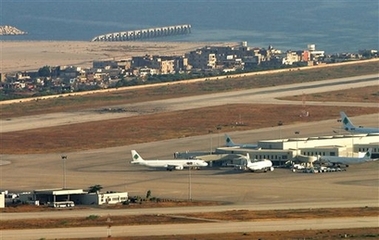BEIRUT, Lebanon - Israel intensified its attacks against Lebanon on Thursday,
blasting Beirut's international airport and the southern part of the country in
its heaviest air campaign against its neighbor in 24 years. More than two dozen
civilians were killed, officials said.

A crater is seen next
to planes on a runway after Israeli warplanes targeted the Rafik Hariri
International Airport, in Beirut, Lebanon, Thursday, July 13, 2006.
Israeli forces intensified their attacks in Lebanon on Thursday, with
airstrikes that blasted the country's only international airport and the
Hezbollah TV station in what was Israel's heaviest air campaign against
Lebanon since the 1982 invasion. [AP] |
The strikes on the airport, which damaged three runways, came hours before
Israel said it was imposing an air and naval blockade on Lebanon to cut off
supply routes to Lebanese militants.
The airport, located in the Hezbollah-controlled southern suburbs of Beirut,
was closed after the attacks and flights were diverted to nearby Cyprus. It was
the first time since Israel's 1982 invasion of Lebanon and occupation of Beirut
that the airport was hit by Israel.
Israel also fired a missile at the building housing the studios of
Hezbollah's Al-Manar TV in the southern suburbs of Beirut on Thursday morning,
the channel's press officer Ibrahim Farhat told The Associated Press. One person
was hurt, but the station continued to broadcast.
Overnight Israeli attacks in southern Lebanon, meanwhile, killed 26 civilians
and wounded dozens more, Lebanese security officials said. A family of 10 and
another family of seven were killed in their homes in the village of Dweir near
Nabatiyeh, the officials said, speaking on condition of anonymity as they were
not authorized to speak to the press.
Later Thursday, Lebanese guerrillas fired volleys of rockets at northern
Israel, killing an Israeli woman in her home in the border town of Nahariya,
officials said. Five people were wounded.
The strikes followed a cross-border raid by Hezbollah guerrillas Wednesday
during which two Israeli soldiers were captured. The militants demanded the
release of Israeli-held prisoners, but Israel responded by bombing Lebanon and
sending ground troops across the border for the first time in six years.
Eight Israeli soldiers and three Lebanese were killed in fighting Wednesday.
Israeli Prime Minister Ehud Olmert called the Hezbollah raid an "act of war"
by Lebanon and threatened "very, very, very painful" retaliation. The Cabinet,
meeting Wednesday in the wake of the military's highest daily death toll in four
years, decided to continue the army operation and call on the international
community to disarm Hezbollah, according to participants.
On Thursday, Israeli Foreign Ministry spokesman Mark Regev said the offensive
in Lebanon has far-reaching objectives, including pushing Hezbollah militants
away from the Israeli border and eventually sidelining the group altogether.
"We must neutralize the hostile terrorist infrastructure that exists in
Lebanon," he said.
Israeli Defense Minister Amir Peretz also demanded that Lebanese army forces
be deployed along the border. Lebanon has long refused to do this, saying that
it is not in business of protecting Israel's northern border.
The Lebanese government said Wednesday that it had not known of the Hezbollah
operation, did not condone it and bore no responsibility for it. The Lebanese
Cabinet, which includes two Hezbollah ministers, urged the U.N. Security Council
to intervene.